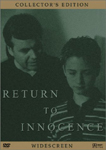

 |
Return
to Innocence
|
 |
|
Ladymol's Review Where does it say that abuse of kids equals gay? This is not a gay movie. Itís also black and white and really old looking. The acting is pretty dire and the whole situation just seemed ludicrous. A boy who has been abused since the age of 7 is taken into care. His counsellor then admits to fooling around with him Ė mutual masturbation and getting the boy to suck him off, which isnít (apparently) abuse until he tells the boy not to tell anyone. I just donít get it. I didnít finish this one; it just seemed daft to me.† Cerisaye's Review It is very interesting that this film is categorised as gay interest, because it contains only one gay character.† And he isnít seen in a positive light.† Which was one aspect I didnít like in a thought-provoking story.† I imagine the gay tag comes from the controversial subject matter:† paedophilia, boy-love and child molestation.† However, the main characters involved, two members of staff in a treatment centre for abused boys, are both married family men who do not fit the stereotype of the sexually predatory dirty old man. The film is based on a novel, however, has the feel of a documentary taken from real life.† Maybe that is down to the decision to film in starkly lit black & white, which gives the movie a tense, atmospheric look that could take place anywhere, anytime.† As usual with these extreme low budget productions, acting quality varies greatly, but main parts are fine.† Particularly outstanding is young Andrew Martin, the boy playing Tommy Jackson, 13 year-old victim of emotional, physical and sexual abuse. He is taken into custody by the Dept. of Social Services when his mother is arrested by the FBI for selling pornographic videos of her son on the internet.† Tommy is very convincing, engaging our sympathy from his opening shots. Richard Meese takes on the difficult role of Glenn, founder/director of† treatment centre New Horizons from whose POV the whole story is told.† That was another niggle.† I wouldíve liked more of Tommy.† As it is we see him only through Glennís eyes, which makes it difficult to judge the boyís actions and motivations, vital to the plot.† Glenn is asked by another counsellor, Chris, to take Tommy for a weekend home visit because he says his 9 months pregnant wife canít cope.† Tommy is upset and withdrawn, so Chris comforts him.† The boy says Chris doesnít like him anymore.† So Glenn has it out with the counsellor:† he was sexually involved† with the boy, then panicked about the consequences.† Glenn is clear the relationship was abusive only because Chris abandoned Tommy, leaving him hurt, ashamed and confused.† A report is prepared, but Glenn is persuaded not to take action, because it would cause more harm.† However, this backfires when circumstances bring everything out into the open, and Tommy lashes out at the man he holds responsible for destroying his relationship with Chris, accusing Glenn of molesting him.† Glenn has information that would clear his name but refuses to use it, thereby breaking a trust with Tommy about a promise he made to him and Chris. Glenn is an internationally renowned expert in the field of male adolescent sexuality.† Accused falsely, he is tainted, so even a poolside moment of intimacy with his own son gets misconstrued and pornographic material he used for research is held up as evidence of guilt.† He enters a nightmarish world where facts are twisted to give an appearance of guilt impossible to disprove, except by asking the jury to examine the context to arrive at the truth.† The only graphic content is a doctorís testimony on Tommyís physical condition, where no detail is spared. This film is hugely relevant.† Anyone who works with children could be put in Glennís position.† It is the reason teachers donít hug or comfort upset children anymore, why organisations like the Scouts canít recruit male leaders.† A man once accused, cannot go back.† Child molestation is the worst crime anyone can be accused of:† innocent or guilty he wears a brand like a scarlet letter for life. The film makes much of the distinction between paedophilia which is abusive, and pederasty which Glenn believes isnít necessarily harmful to boys.† I suspect this is the real reason why Glenn is straight, so we are more inclined to believe his affection for damaged boys like Tommy is pure.† It wouldíve been more powerful drama if theyíd had the courage to make Glenn a gay man.† Men loving boys is way more muddied than this film suggests† However, as courtroom drama itís dark and disturbing, riveting viewing, horribly real.† If we hadnít known beyond doubt that Glenn was innocent, it couldíve been even more intense.† The filmmakers make sure weíre on Glennís side, a man of integrity who puts his own interests behind those of boys trusted to his care, even facing prison for a crime he didnít commit.† It makes an interesting companion-piece to For a Lost Soldier.† The relationship between Tommy and Chris isnít given enough attention, maybe because itís a lot harder to sell a sexual relationship than the cosy boy-love shown by Glenn.† It over-eggs the pudding too to have a former boy prostitute, now married with children, helped by Glenn show up to speak up passionately for his saintly caring qualities in court.† He was also very lucky to have a hotshot lawyer as a friend.† Compulsive, but uncomfortable, viewing.†
|
Buy Return to Innocence (REGION 1) (NTSC) from Amazon here